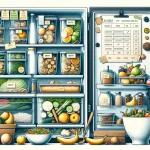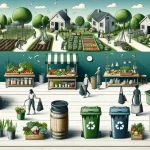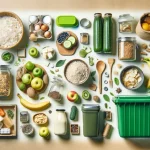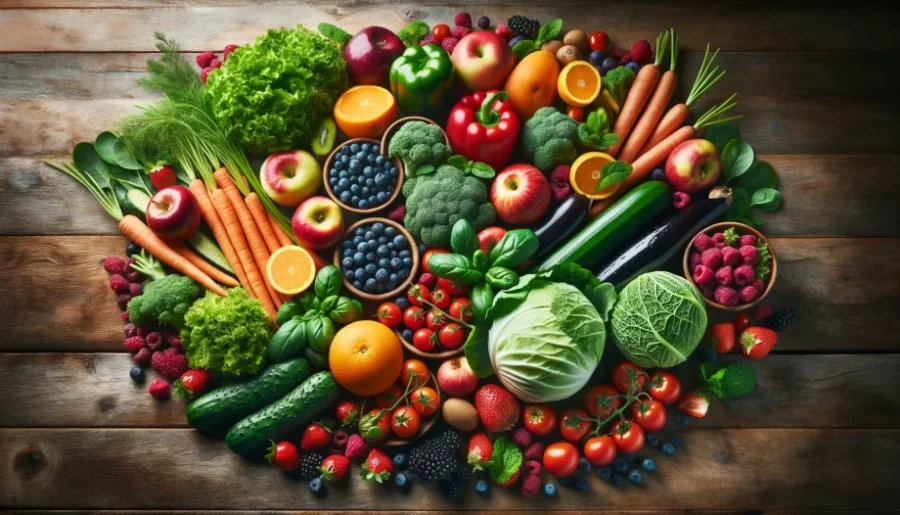
Discover the benefits of a plant-based zero-waste diet! Learn how to enjoy delicious, sustainable meals that are good for you and the planet.
Plant-Based Zero-Waste Diet
Key Takeaways:
- A plant-based zero-waste diet is a sustainable approach to eating that focuses on consuming whole, plant-based foods while minimizing waste.
- It involves using every part of the food, reducing packaging, and composting organic waste.
- This diet benefits personal health and the environment by reducing greenhouse gas emissions and conserving resources.
Welcome to the world of a plant-based zero-waste diet, where every meal is an opportunity to nourish your body and protect the environment.
This plant-based eating lifestyle is all about embracing whole, natural foods and saying goodbye to unnecessary waste.
Join us on this journey to healthier eating and a greener planet!
Plant-Based Zero-Waste Diet: A Sustainable Approach to Healthy Eating
The shift towards sustainable living is more crucial than ever, and our dietary choices play a significant role in this movement.
In this blog post, we’ll explore the concept of a plant-based zero-waste diet, a lifestyle choice that not only benefits our health but also significantly reduces our environmental footprint.
Importance of Sustainable Living and the Impact of Food Waste
Sustainable living is about making choices that ensure the well-being of our planet for future generations.
One of the key aspects of this lifestyle is reducing food waste, which has a profound impact on the environment.
By minimizing waste, we can conserve resources, reduce greenhouse gas emissions, and less waste reduces the burden on landfills.
Overview of a Plant-based zero-waste Diet
A plant-based zero-waste diet is a holistic approach to eating that focuses on consuming whole, plant-based foods while minimizing waste.
You don’t have to adhere strictly to vegan lifestyle or vegetarian diet, but they are characterized by a low frequency of consuming animal-based foods.
This diet emphasizes the importance of using every part of the food, from leaf to root and avoiding single-use packaging.
By adopting this lifestyle, individuals can enjoy nutritious meals, support animal welfare, and contribute to a healthier planet.
What is a Plant-Based Zero-Waste Diet?
In today’s world, where sustainability is becoming increasingly important, a plant-based zero-waste diet offers a path to a healthier lifestyle and a cleaner planet.
This section delves into the definition, principles, and goals of this eco-friendly dietary approach.
A plant-based diet is a diet consisting mostly or entirely of plant-based foods. Plant-based diets encompass a wide range of dietary patterns that contain low amounts of animal products and high amounts of fiber-rich plant products such as vegetables, fruits, whole grains, legumes, nuts and seeds. They do not need to be vegan or vegetarian but are defined in terms of low frequency of animal food consumption. Wikipedia
Table: What is a Plant-Based Zero-Waste Diet?
| Principle | Description |
|---|---|
| Reduce | Use less of or do without unnecessary ingredients. Cook smaller portions to avoid excessive leftovers. |
| Reuse | Repurpose food scraps instead of throwing them out. Use reusable containers to buy foods in bulk. |
| Recycle | Compost leftover food scraps. Buy food from food rescue organizations to prevent waste. |
Definition and Principles of a Zero-Waste Lifestyle
Zero-waste living is a philosophy that aims to reduce our environmental impact by minimizing the amount of waste we produce.
It’s based on the principles of reduce, reuse, recycle, focusing on conserving resources, avoiding single-use items, and finding creative ways to repurpose what we already have.
Applying Zero-Waste Concepts to a Plant-Based Diet
Transitioning to a plant-based diet within the zero-waste framework involves choosing whole, unprocessed foods that come with minimal packaging.
It’s about making conscious decisions at the grocery store, like opting for bulk store purchases and bringing your own container, to reduce reliance on plastic and other disposable materials.
The Goal of Minimizing Food and Packaging Waste
The ultimate aim of a plant-based zero-waste diet is to significantly reduce the amount of food and packaging waste that ends up in landfills.
By carefully planning meals, using every part of the plant, and composting food scraps, individuals can make a positive impact on the environment and contribute to the sustainability of our food systems.
The Benefits of a Plant-Based Zero-Waste Diet

Embracing a plant-based zero-waste diet offers a multitude of benefits that extend beyond personal health to encompass environmental and economic advantages.
Let’s explore how this lifestyle choice can lead to a more sustainable and prosperous future.
Environmental Benefits: Reducing Food Waste and Greenhouse Gas Emissions
One of the most significant environmental benefits of a plant-based zero-waste diet is the reduction of food waste.
By repurposing food scraps and composting, we can minimize the amount of waste sent to landfills, where it produces methane, a potent greenhouse gas.
Additionally, a plant-based diet has a lower carbon footprint compared to diets high in animal products, further contributing to the fight against climate change.
Health Benefits: Nutrient-rich plant-based Meals and Reduced Exposure to Chemicals
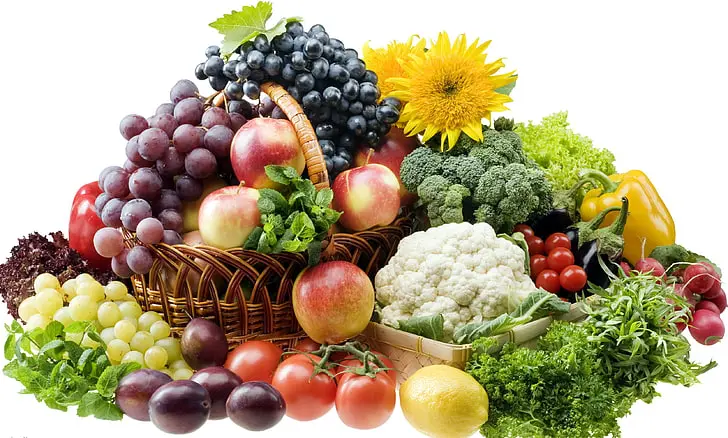
Adopting a plant-based diet rich in whole foods like fruits, vegetables, legumes, and grains can lead to improved health outcomes.
These nutrient-dense foods provide essential vitamins and minerals, while a zero-waste approach reduces exposure to harmful chemicals found in processed foods and packaging materials.
Economic Benefits: Saving Money by Reducing Waste and Making Mindful Choices
A plant-based zero-waste diet can also be kind to your wallet.
By buying in bulk, avoiding unnecessary packaging, and using every part of your produce, you can save money on groceries.
Additionally, making mindful choices about what you consume can lead to less food waste, further reducing expenses.
Table: The Benefits of a Plant-Based Zero-Waste Diet
| Benefit Type | Description |
|---|---|
| Environmental | Reduces food waste and greenhouse gas emissions. |
| Health | Provides nutrient-rich plant-based meals and reduces exposure to chemicals. |
| Economic | Saves money by reducing waste and making mindful choices. |
Challenges and Realities
While the concept of a plant-based zero-waste diet is appealing, it’s important to acknowledge the challenges and realities that come with striving for this lifestyle.
Let’s delve into the feasibility and limitations of achieving zero waste.
Addressing the Feasibility of a Completely Zero-Waste Lifestyle
Achieving a completely zero-waste lifestyle can be challenging due to the structure of our current food system and the prevalence of packaged goods.
While it’s possible to make significant reductions in waste, it may not always be feasible to eliminate it entirely.
Factors such as the availability of bulk stores, access to fresh produce, and personal circumstances can impact one’s ability to fully embrace a zero-waste lifestyle.
Understanding the Limitations and Focusing on Progress Rather Than Perfection
It’s important to recognize that zero-waste living is a journey rather than a destination.
There will be limitations and obstacles along the way, but the key is to focus on progress rather than perfection.
Celebrate the small victories, such as choosing reusable containers or composting food scraps, and don’t be discouraged by occasional setbacks.
Every effort counts towards reducing your environmental impact and promoting a more sustainable future.
Practical Tips for Starting a Plant-Based Zero-Waste Diet
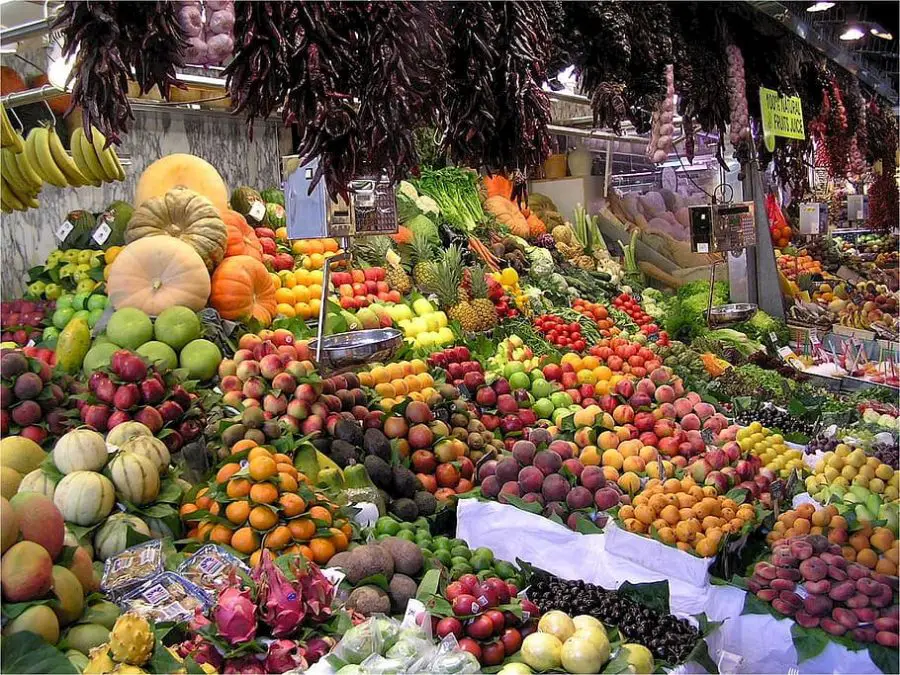
Embarking on a plant-based zero-waste diet can be a rewarding journey.
Here are some practical tips to help you get started and make the transition smoother.
Meal Planning and Preparation Strategies
Start by planning your meals for the week. This helps you buy only what you need, reducing the chance of food waste.
Consider incorporating versatile ingredients that can be used in multiple dishes.
Preparing meals in advance can also save time and ensure you have healthy, plant-based options readily available.
Shopping Tips: Buying in Bulk, Using Reusable Containers, and Choosing Package-Free Items
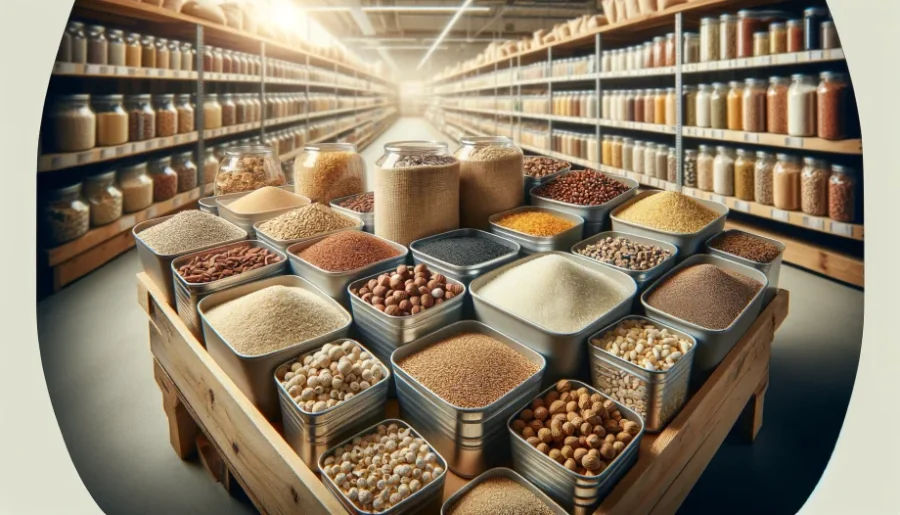
When shopping, opt for bulk store purchases to reduce packaging waste.
Bring your own reusable containers and bags to carry your groceries.
Look for package-free or minimally packaged items, especially for fresh produce.
Creating a Zero-Waste Shopping List
- “One of the best ways to reduce waste is by planning your shopping list carefully. Include staples like black beans, almond milk, and bell peppers. For a sweet treat, opt for maple syrup or vegan chocolate chips.
Creative Ways to Repurpose Food Scraps and Leftovers
Get creative with your food scraps and leftovers. Vegetable peels and scraps can be used to make flavorful stocks and broths.
Leftover fruits can be turned into smoothies or desserts. Experiment with different ways to give new life to your leftovers.
Composting Organic Waste
Set up a compost bin to recycle organic waste like fruit and vegetable peels, coffee grounds, and eggshells.
Composting not only reduces waste but also creates nutrient-rich soil for your garden.
Storing Food Properly to Extend Shelf Life
Proper storage is key to extending the shelf life of your food.
Keep your refrigerator and pantry organized, and store foods in appropriate conditions to prevent spoilage.
Use airtight containers to keep food fresh for longer.
Preserving Foods Through Freezing, Pickling, Canning, and Dehydrating
Preserve surplus fruits and vegetables by freezing, pickling, canning, or dehydrating them.
These methods not only reduce waste but also provide you with a variety of ingredients to use in your plant-based meals throughout the year.
Table: Practical Tips for Starting a Plant-Based Zero-Waste Diet
| Tip Category | Tips |
|---|---|
| Meal Planning | Plan meals for the week, incorporate versatile ingredients, prepare meals in advance. |
| Shopping | Buy in bulk, use reusable containers, choose package-free items. |
| Food Repurposing | Use vegetable scraps for broth, turn overripe fruits into smoothies, make pesto from leftover greens. |
| Composting | Set up a compost bin for organic waste like fruit and vegetable peels. |
| Food Storage | Store food properly to extend shelf life, use airtight containers, keep fridge and countertops clean. |
| Food Preserving | Freeze, pickle, can, or dehydrate surplus fruits and vegetables. |
Eating Out and Socializing
Enjoying meals with friends and family is a cherished part of life, but it can be challenging to maintain a zero-waste lifestyle in social settings.
Here are some tips for navigating zero-waste eating when dining out or ordering takeout.
Navigating Zero-Waste Eating in Social Settings and Restaurants
When eating out, look for restaurants that prioritize sustainability and offer plant-based options.
Don’t hesitate to ask about the source of their ingredients and whether they have any zero-waste initiatives.
If possible, choose dishes that are less likely to generate waste, such as those made with whole foods and minimal packaging.
Tips for Minimizing Waste When Ordering Takeout or Dining Out
- Bring Your Own Containers: If you’re getting takeout, consider bringing your own reusable containers to avoid disposable packaging.
- Say No to Single-Use Items: Politely decline single-use items like plastic utensils, straws, and napkins. Bring your own if necessary.
- Portion Control: Be mindful of portion sizes to avoid leftovers. If you do have leftovers, take them home in your reusable container for another meal.
- Support Eco-Friendly Establishments: Choose restaurants that are known for their commitment to sustainability and waste reduction.
- Communicate Your Preferences: Don’t be shy about expressing your desire for a zero-waste meal. Many restaurants are willing to accommodate special requests.
By being mindful and proactive, you can enjoy socializing and dining out while staying true to your plant-based zero-waste values.
Incorporating Plant-Based Alternatives
- Embracing a plant-based zero-waste diet doesn’t mean sacrificing flavor. Use almond milk in your morning coffee, spread vegan butter on your toast, and explore vegan cheese options for your sandwiches. These plant-based alternatives are delicious and kinder to the planet.
Zero-Waste Snacking
- Snacking can be both healthy and zero-waste with a little creativity. Make a batch of energy balls with peanut butter, oats, and maple syrup. Keep a stash of homemade granola bars or roasted pumpkin seeds for a quick, nutritious snack.
Zero-Waste Cooking Techniques
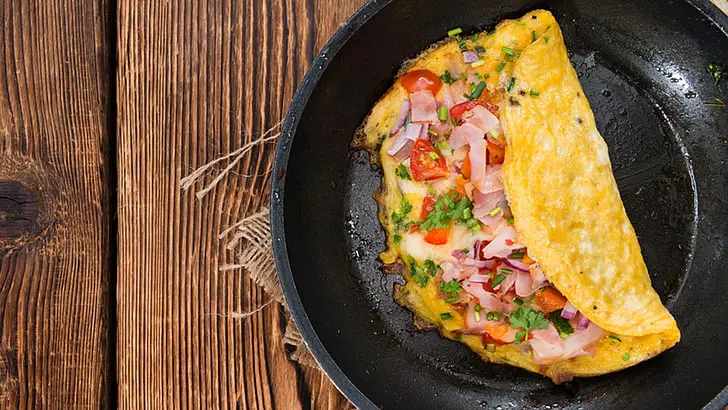
Adopting zero-waste cooking techniques is a fantastic way to minimize your environmental impact while enjoying delicious plant-based meals.
Here are some ideas and inspiration to help you get started.
Ideas for Plant-Based Meals and Snacks That Generate Minimal Waste
- Smoothie Bowls: Use overripe fruits and vegetables to create nutritious and colorful smoothie bowls. Top with nuts, seeds, and homemade granola for added texture and flavor.
- Stir-Fries: Combine leftover vegetables with tofu or tempeh for a quick and easy stir-fry. Serve over cooked brown rice or quinoa for a complete meal.
- Soups and Stews: Utilize vegetable scraps and peels to make a flavorful broth as the base for soups and stews. Add beans, lentils, and any leftover veggies for a hearty dish.
- Energy Bites: Mix together dates, nuts, seeds, and oats to create energy bites. These are perfect for a zero-waste snack on the go.
- Veggie Wraps: Use large leafy greens like collard greens or lettuce as wraps for a variety of fillings, such as hummus, sliced veggies, and cooked grains.
Recipes and Inspiration for Zero-Waste Cooking
- Compost Cookies: Bake cookies using a variety of leftover ingredients such as chocolate chips, nuts, and dried fruits. These treats are a delicious way to repurpose pantry odds and ends.
- Zero-Waste Pesto: Make pesto using carrot tops, beet greens, or other leftover greens. Blend with garlic, nuts, and olive oil for a flavorful sauce.
- Root-to-Stem Salad: Create a salad using every part of the vegetable, from root to stem. For example, use beetroot, beet greens, and thinly sliced beet stems in a vibrant salad.
- Vegetable Scrap Stock: Collect vegetable scraps in a freezer bag and, once you have enough, simmer them in water to create a homemade vegetable stock.
- Banana Peel Bacon: Transform banana peels into a savory, smoky snack by marinating and baking them until crispy.
By incorporating these zero-waste cooking techniques and recipes into your routine, you can enjoy a variety of plant-based meals and snacks while reducing your environmental footprint.
Simple Toss-Together Meals for Today’s Busy World
- In today’s busy world, quick and easy meals are a lifesaver. Try simple toss-together salads with mixed greens, sunflower seeds, and a drizzle of olive oil and lemon juice. For a hearty meal, stir-fry bell peppers, black beans, and tofu with your favorite spices
FAQ Section
Navigating a plant-based zero-waste diet can raise many questions. Here are some common queries and their answers to help you on your journey.
Q: What is the downside of a plant-based diet?
A: While plant-based diets offer numerous health benefits, potential downsides include the risk of nutrient deficiencies, such as vitamin B12, iron, and omega-3 fatty acids.
It’s important to plan your diet carefully and consider supplementation if necessary.
Q: Does a plant-based diet reduce food waste?
A: Yes, a plant-based diet can significantly reduce food waste.
By focusing on whole foods and minimizing packaged goods, you can cut down on the amount of waste produced.
Additionally, plant-based diets often incorporate more parts of fruits and vegetables, further reducing waste.
Q: What are zero-waste foods?
A: Zero-waste foods are items that can be consumed in their entirety or have minimal packaging.
Examples include bulk grains, legumes, fruits, and vegetables. The goal is to choose foods that leave little to no waste behind.
Q: Do you eat eggs on a plant-based diet?
A: Eggs are not typically included in a strict plant-based vegan diet, which focuses on foods derived from plants.
However, some people following a plant-based diet may choose to include eggs for protein and nutrient intake.
Q: Can you eat cheese on a plant-based diet?
A: Traditional cheese made from animal milk is not included in a plant-based vegan diet. However, there are many plant-based cheese alternatives made from nuts, seeds, and other plant sources.
Q: What are 5 plant-based foods?
A: Five common plant-based foods are lentils, quinoa, spinach, almonds, and apples.
These foods provide a range of nutrients and can be incorporated into various meals.
Conclusion
Embracing a plant-based zero-waste diet is a powerful way to contribute to a healthier planet and a healthier you.
As we conclude, let’s reflect on the importance of sustainable habits and the positive impact they can have.
The Importance of Adopting Sustainable Habits for the Planet and Personal Health
Adopting sustainable habits is crucial for the well-being of our planet and ourselves.
By choosing a plant-based zero-waste diet, we can reduce greenhouse gas emissions, conserve natural resources, and minimize pollution.
Additionally, this lifestyle supports personal health by promoting a diet rich in whole, nutrient-dense foods, free from harmful chemicals and additives.
Encouragement to Start Small and Make Incremental Changes Towards a Plant-Based Zero-Waste Diet
Embarking on a plant-based zero-waste journey may seem daunting, but remember, every small step counts.
Start by incorporating more zero-waste meals into your diet, reducing your use of single-use plastics, and being mindful of food waste.
Gradually, these small changes will become part of your daily routine, leading to a more sustainable and healthy lifestyle.
In conclusion, a plant-based zero-waste diet offers a path to a more sustainable and healthy future.
By making mindful choices and embracing change, we can all contribute to a better world for ourselves and future generations.
Resources
Embarking on a plant-based zero-waste journey is an exciting adventure, and having the right resources can make all the difference.
Below are some links to additional information, recipes, and communities to support you along the way.
Additional Information:
- Zero Waste Home: A comprehensive guide to reducing waste in all aspects of life.
- Plant Based News: A resource for the latest news and information on plant-based living.
Recipes:
- Minimalist Baker: Simple and delicious plant-based recipes, many of which are zero-waste friendly.
- Zero Waste Chef: A blog dedicated to zero-waste cooking, featuring a variety of plant-based recipes.
Zero-Waste Communities:
- Zero Waste International Alliance: An organization promoting zero waste around the world, with resources and information on how to get involved.
- Going Zero Waste: A blog and community focused on zero-waste living, with tips and tricks for reducing waste in everyday life.
These resources can provide inspiration, support, and practical advice as you embark on your plant-based zero-waste journey.
Finding Inspiration for Plant-Based Zero-Waste Meals
- For more recipe ideas and inspiration, check out vegan blogs and YouTube channels. They often feature simple, healthy meals like banana pancakes or steel-cut oats for breakfast, and hearty dishes like black bean tacos or lentil soup for lunch and dinner.

